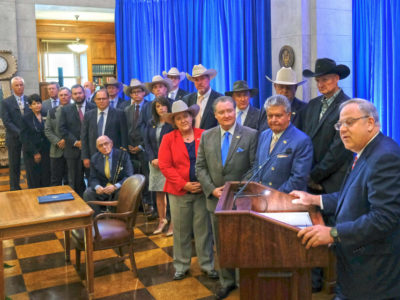U.S. Fish and Wildlife Service
Deconstructing the Supreme Court’s First Environmental Law Decision of the Year (Sort Of)…
…And Newly-Arrived Justice Barrett’s First Majority Opinion
Earlier this month, the U.S. Supreme Court issued its first environmental law-related decision of its current Term–U.S. Fish and Wildlife Service v. Sierra Club. I say “environmental law-related” because the heart of the case concerns whether certain federal government documents are disclosable to the public under the Freedom of Information Act (FOIA). But the case …
CONTINUE READINGTrump Administration Attempts to Eviscerate the Endangered Species Act
Rather Than “Improve” ESA, Newly-Adopted Regulations Dramatically Erode Its Historic Protections
The Endangered Species Act, enacted in 1973, has for most of its history been the most controversial and politically-charged of all the foundational environmental laws adopted by Congress in the 1970’s. But despite its contentious history, opponents of the ESA have been unsuccessful in their efforts to weaken the law, either through significant Congressional amendments …
Continue reading “Trump Administration Attempts to Eviscerate the Endangered Species Act”
CONTINUE READINGEndangered Deference
The Supreme Court’s recent, misguided, Weyerhaeuser decision displays the Court majority’s hostility to agency expertise
Cross-posted from The Regulatory Review In Weyerhaeuser v. US Fish and Wildlife Service, a unanimous Supreme Court, with Justice Gorsuch not participating, indicated that it is not inclined to defer to agency expertise. Judicial power dominates this Court’s approach to administrative law, not just in the context of Chevron deference, and not just within the …
Continue reading “Endangered Deference”
CONTINUE READINGWhen is unoccupied habitat “critical”?
The Supreme Court will hear a challenge to the critical habitat designation for the dusky gopher frog
Controversy and litigation have been pervasive since adoption of the Endangered Species Act in 1973, but the Supreme Court has been a relatively minor player in the law’s development. By my count, the Court so far has only addressed the substantive merits of an ESA claim three times (in TVA v Hill, 437 US 153 …
Continue reading “When is unoccupied habitat “critical”?”
CONTINUE READING200 Days and Counting: Public Lands
The potential impact of a Trump Administration on our federal public lands.
The federal government owns almost one-third of the land in the United States, primarily concentrated in the Western states. In addition, the federal government is the primary manager of the oceans off the coast of the United States (with the exception of oceans within three miles of the coastline, which are primarily under state authority). …
Continue reading “200 Days and Counting: Public Lands”
CONTINUE READINGNinth Circuit upholds gray wolf rider
As expected, the Ninth Circuit has now upheld the appropriations rider that directed the Fish and Wildlife Service to reissue its rule removing the gray wolf in Montana and Idaho from the list of endangered and threatened species. (Hat tip: Endangered Species Law and Policy blog.) The panel (all drawn from the Ninth Circuit’s …
Continue reading “Ninth Circuit upholds gray wolf rider”
CONTINUE READINGGuest Blogger Justin Pidot: The Gray Wolf Delisting Revisited
Last week, Holly posted an excellent discussion of the latest wranglings in the Fish & Wildlife Service’s ongoing effort to delist the gray wolf in the mountain west. I share her discomfort with Congress’s decision to reinstate the delisting decision through an appropriations rider. But stepping back from the arcane separation of powers questions dominant …
Continue reading “Guest Blogger Justin Pidot: The Gray Wolf Delisting Revisited”
CONTINUE READINGA big news week for the Sacramento-San Joaquin River Delta
This has been a significant news week for California’s delta. On Wednesday, California’s Natural Resources Agency endorsed a plan for a water tunnel system to bypass the Sacramento-San Joaquin River Delta, coupled with a habitat restoration plan for the Delta. Bettina Boxall’s story in today’s Los Angeles Times has the details. Many environmental groups …
Continue reading “A big news week for the Sacramento-San Joaquin River Delta”
CONTINUE READINGEndangered listing for Delta smelt warranted but precluded
Finally completing work on a petition submitted by the Center for Biological Diversity in 2006, the US Fish and Wildlife Service has determined that reclassifying the Delta smelt from threatened to endangered is “warranted but precluded.” That means the population decline is dramatic enough to justify the conclusion that the smelt is in fact endangered, …
Continue reading “Endangered listing for Delta smelt warranted but precluded”
CONTINUE READINGClimate adaptation developments
With hopes for rapid global or domestic reductions in greenhouse gas emissions fading, the importance of adaptation becomes ever more apparent. Those responsible for protecting public health, maintaining infrastructure, and managing water and wildlife understand that they are facing enormous challenges. Policymakers, resource managers, stakeholders, and the scientific community are all beginning to respond. Here …
Continue reading “Climate adaptation developments”
CONTINUE READING





